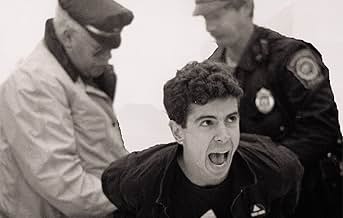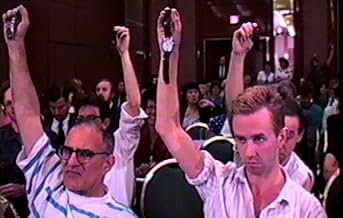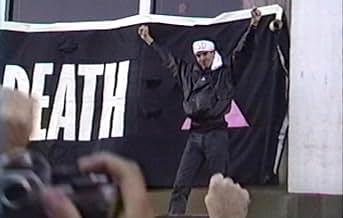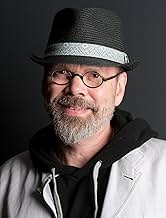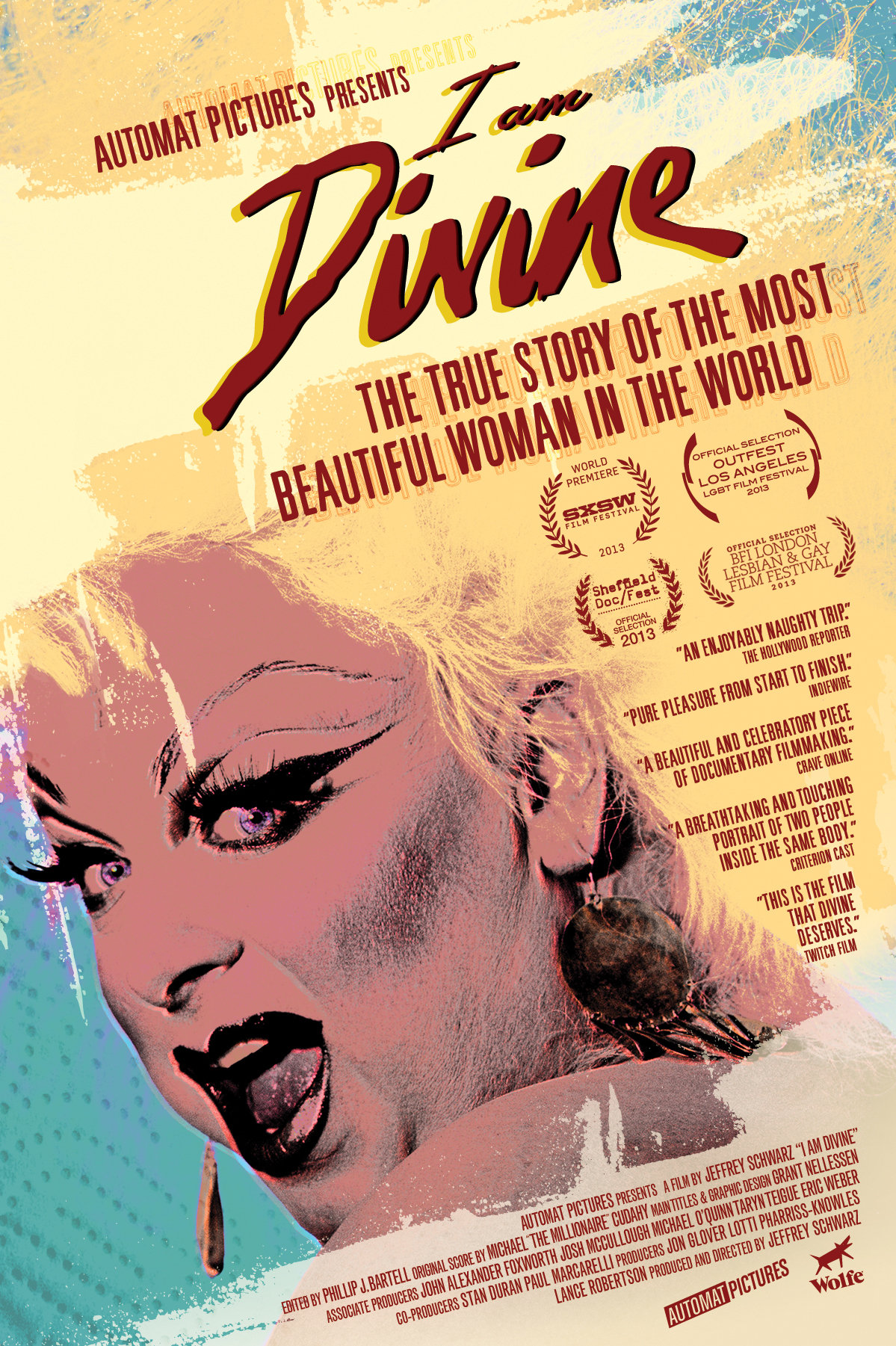PUNTUACIÓN EN IMDb
7,6/10
4,5 mil
TU PUNTUACIÓN
Añade un argumento en tu idiomaThe story of two coalitions -- ACT UP and TAG (Treatment Action Group) -- whose activism and innovation turned AIDS from a death sentence into a manageable condition.The story of two coalitions -- ACT UP and TAG (Treatment Action Group) -- whose activism and innovation turned AIDS from a death sentence into a manageable condition.The story of two coalitions -- ACT UP and TAG (Treatment Action Group) -- whose activism and innovation turned AIDS from a death sentence into a manageable condition.
- Dirección
- Guión
- Reparto principal
- Nominado para 1 premio Óscar
- 13 premios y 21 nominaciones en total
Iris Long
- Self - Retired Chemist
- (metraje de archivo)
- (as Iris Long PHD)
Bob Rafsky
- Self - PR Executive
- (metraje de archivo)
Ed Koch
- Self - Mayor of New York
- (metraje de archivo)
Barbara Starrett
- Self - AIDS Physician
- (as Dr. Barbara Starrett)
Franke-Ruta Garance
- Self - Teenager
- (as Garance Franke-Ruta)
Mathilde Krim
- Self - AMFAR, The Foundation for AIDS Research
- (as Mathilde Krim PHD)
Jesse Helms
- Self - R - North Carolina
- (metraje de archivo)
Reseñas destacadas
¨Act Up. Fight Back. Fight AIDS.¨
Director David France does an impressive job of gathering information, data, news footage, and home videos during the decade long fight of the activist group known as ACT UP to find a way to stop the AIDS epidemic in this well constructed documentary. The film succeeds in showing us the anger and outrage that these men went through to stop government inaction on such a widespread plague that was killing off millions of people in the world. I was impressed with this chronological history that David France was able to put together in a brilliant way. My only complaint is that some things were repetitive as we see one rally after another in protest against the government. ACT UP assembled to fight and protest against the little support given by the Reagan and Bush administration, against the FDA which was taking too long to approve drugs that several patients needed, and the Catholic Church which condemned them. The documentary is full of anger, and there are several emotional moments as we see what some of these men had to go through in their struggle with the disease. During the 80's having AIDS meant you had almost a 100% chance of dying; it was practically a death sentence. This made the homophobic atmosphere grow in communities where several hospitals neglected to give these patients health care. France follows the activist group, ACT UP, from its forming moments to its divisive ones, and finally to the goals they accomplished through some breakthroughs. It was not an easy fight, but their voice was heard. This is the story of how some of these men were able to survive the plague.
The story begins six years after the AIDS epidemic has begun to spread. It's 1987 and a group of activists known as ACT UP decide to get together in New York City to protest against the way the AIDS epidemic has been treated. They form a coalition for healthcare after over half a million people had died of AIDS around the world. We follow the protests taking place against some government officials and the activists finally begin to get their voiced heard. David France isn't afraid of sharing some strong images with the viewer as he shows everything in a very raw manner. Their next rallies take place over the country protesting against gay hate, and later we see them protest against the FDA for taking too much time to approve drugs. This leads some of the activists to begin receiving some underground drug treatments in order to try to expand their life as the sickness begins taking a toll on them. They begin to study and discover what the disease really was and fight for possible solutions as they form committees in order to understand AIDS better. They also form support groups for those people who had fear of coming out during that dangerous time. They studied several ways to slow down the virus, but as time passed more and more deaths were taking place. The film follows the decade long fight of ACT UP from 1987 to 1996 where they finally reached a breakthrough, although it came at a great cost.
Some of the important things the AIDS community accomplished were rising consciousness of what the disease really was, they made AIDS become an important issue during the 1992 presidential campaign, and they finally found drugs that helped slow down the effects of the virus. It wasn't an easy fight as we feel the anger some of these men had towards the ineptness of the government of the time and the loss of some of their close friends and relatives. This was a very insightful story and part of American history that needed to be told. France did an excellent job at putting together all the footage and delivering a powerful and emotional documentary. It did drag a little, but it was a strong film.
http://estebueno10.blogspot.com/
Director David France does an impressive job of gathering information, data, news footage, and home videos during the decade long fight of the activist group known as ACT UP to find a way to stop the AIDS epidemic in this well constructed documentary. The film succeeds in showing us the anger and outrage that these men went through to stop government inaction on such a widespread plague that was killing off millions of people in the world. I was impressed with this chronological history that David France was able to put together in a brilliant way. My only complaint is that some things were repetitive as we see one rally after another in protest against the government. ACT UP assembled to fight and protest against the little support given by the Reagan and Bush administration, against the FDA which was taking too long to approve drugs that several patients needed, and the Catholic Church which condemned them. The documentary is full of anger, and there are several emotional moments as we see what some of these men had to go through in their struggle with the disease. During the 80's having AIDS meant you had almost a 100% chance of dying; it was practically a death sentence. This made the homophobic atmosphere grow in communities where several hospitals neglected to give these patients health care. France follows the activist group, ACT UP, from its forming moments to its divisive ones, and finally to the goals they accomplished through some breakthroughs. It was not an easy fight, but their voice was heard. This is the story of how some of these men were able to survive the plague.
The story begins six years after the AIDS epidemic has begun to spread. It's 1987 and a group of activists known as ACT UP decide to get together in New York City to protest against the way the AIDS epidemic has been treated. They form a coalition for healthcare after over half a million people had died of AIDS around the world. We follow the protests taking place against some government officials and the activists finally begin to get their voiced heard. David France isn't afraid of sharing some strong images with the viewer as he shows everything in a very raw manner. Their next rallies take place over the country protesting against gay hate, and later we see them protest against the FDA for taking too much time to approve drugs. This leads some of the activists to begin receiving some underground drug treatments in order to try to expand their life as the sickness begins taking a toll on them. They begin to study and discover what the disease really was and fight for possible solutions as they form committees in order to understand AIDS better. They also form support groups for those people who had fear of coming out during that dangerous time. They studied several ways to slow down the virus, but as time passed more and more deaths were taking place. The film follows the decade long fight of ACT UP from 1987 to 1996 where they finally reached a breakthrough, although it came at a great cost.
Some of the important things the AIDS community accomplished were rising consciousness of what the disease really was, they made AIDS become an important issue during the 1992 presidential campaign, and they finally found drugs that helped slow down the effects of the virus. It wasn't an easy fight as we feel the anger some of these men had towards the ineptness of the government of the time and the loss of some of their close friends and relatives. This was a very insightful story and part of American history that needed to be told. France did an excellent job at putting together all the footage and delivering a powerful and emotional documentary. It did drag a little, but it was a strong film.
http://estebueno10.blogspot.com/
"How to Survive a Plague" is a gripping documentary that tracks down the chronological history of HIV and AIDS, from its onset in the early 80's to today. During the 80's, it was actually a plague killing millions of people. The documentary focuses on two advocacy groups ACT and TAG, and their tireless work for decades to persuade U.S. governments to allocate more funds for AIDS research and medicine. Their efforts helped turn AIDS from a fatal disease to a manageable condition. This documentary might be hard to survive through; not because of any inadequacy but because of the frightful scenes showing how many young people with bright futures died from AIDS. Director David France proficiently exhibits the work of ACT and later TAG from its very beginnings, and then finalizes it showing several ACT & TAG members today in how they were able to survive AIDS. These brave & honorable men practically saved their own lives with their advocacy efforts, and that is one ACT that if hard to follow. OK, now TAG, you are it. Because it is your turn to get educated with France's love letter to ACT & TAG with a "How to Survive a Plague" viewing. **** Good
By using (mostly) never before seen archival footage, David France's unflinching documentary "How to Survive a Plague" DOCUMENTS the early epidemic of the AIDS virus in the United States, during a time when it was seen as a death sentence.
With a mixture of video from protests, support rallies and home movies, France portrays actual struggling AIDS victims/activists as their friends and family members begin to go blind and die around them, and the US government does little in way of assistance. France also does a great job of not only showcasing the overwhelming amount of discrimination during the 80's and 90's, which altogether ostracized anybody with AIDS or people that had any linkage to the gay communities, but succeeds in his attempts to dissect the human condition, by showing how far a determined group of people are willing to go for change.
The rest of the footage, which shows government officials such as former Senator Jesse Helms, former President Ronald Regan and former President George Bush Sr. is maybe the most shocking aspect of this film; as they come off as negligent and at times so blatantly prejudiced, that it's disturbing to think how everything depicted here took place only between 20 and 30 years ago.
Beginning in New York with the denial of the AIDS epidemic by former New York Mayor Ed Kotch, to the introduction of the highly toxic drug AZT (the most expensive drug on the market at the time, and the only one used to prolong the life of AIDS patients) to the Roman Catholic Church condemning the use of condoms, and ending with the evolution of ACT UP and TAG (Treatment Action Group) a group of activists (most of whom had the AIDS virus themselves) who revolutionized the way AIDS was treated, turning it into a manageable condition; the importance of this film lies in its documentation of a disenfranchised people during a time in American history that isn't broached in the classroom. But equally as interesting as the subject matter, is how creatively this documentary is put together. This archival footage format is truly an ingenious way to tell a narrative, really working on an almost purely visceral level to capture the times and atmosphere of a real life American revolution, in a way not many documentaries have the ability to do.
Final Thought: "How to Survive A Plague" is not only an informative, fascinating, and sure to be award winning film, but also one of the most powerful documentaries of 2012. There's not much more I can say about this documentary, other than that actually sitting down and witnessing what this film has to say, for yourself will undoubtedly create a deeper impact and elicit more of an emotional response than any mere words can say.
Written by Markus Robinson, Edited by Nicole I. Ashland
Follow me on Twitter @moviesmarkus
With a mixture of video from protests, support rallies and home movies, France portrays actual struggling AIDS victims/activists as their friends and family members begin to go blind and die around them, and the US government does little in way of assistance. France also does a great job of not only showcasing the overwhelming amount of discrimination during the 80's and 90's, which altogether ostracized anybody with AIDS or people that had any linkage to the gay communities, but succeeds in his attempts to dissect the human condition, by showing how far a determined group of people are willing to go for change.
The rest of the footage, which shows government officials such as former Senator Jesse Helms, former President Ronald Regan and former President George Bush Sr. is maybe the most shocking aspect of this film; as they come off as negligent and at times so blatantly prejudiced, that it's disturbing to think how everything depicted here took place only between 20 and 30 years ago.
Beginning in New York with the denial of the AIDS epidemic by former New York Mayor Ed Kotch, to the introduction of the highly toxic drug AZT (the most expensive drug on the market at the time, and the only one used to prolong the life of AIDS patients) to the Roman Catholic Church condemning the use of condoms, and ending with the evolution of ACT UP and TAG (Treatment Action Group) a group of activists (most of whom had the AIDS virus themselves) who revolutionized the way AIDS was treated, turning it into a manageable condition; the importance of this film lies in its documentation of a disenfranchised people during a time in American history that isn't broached in the classroom. But equally as interesting as the subject matter, is how creatively this documentary is put together. This archival footage format is truly an ingenious way to tell a narrative, really working on an almost purely visceral level to capture the times and atmosphere of a real life American revolution, in a way not many documentaries have the ability to do.
Final Thought: "How to Survive A Plague" is not only an informative, fascinating, and sure to be award winning film, but also one of the most powerful documentaries of 2012. There's not much more I can say about this documentary, other than that actually sitting down and witnessing what this film has to say, for yourself will undoubtedly create a deeper impact and elicit more of an emotional response than any mere words can say.
Written by Markus Robinson, Edited by Nicole I. Ashland
Follow me on Twitter @moviesmarkus
How to Survive a Plague is definitely one of the year's most awe-inspiring, riveting, go-into- action documentaries. Through a mightily informative combination of recent interviews and archival footage the film exhibits a noteworthy fight against both ignorance and indifference towards such a deadly epidemic as the one caused by the HIV virus. This is also a serious, heartfelt, touching depiction of a movement that was ready to change something, even if it meant sacrificing a few soldiers along the way. And yes, the word 'soldiers' is perfectly suitable when it comes to all those young people who devoted their whole lives to a global, far-reaching cause.
Year by year, How to Survive a Plague presents a through and insightful look at the actions that propelled the LGBT activists in some of their most tragic days. Undeniably, the story behind such coalitions as Act Up and TAG are exhilarating ones. Even though the then-deadly virus already infected many of those young people, they still didn't lose faith in the cause and decided to stand up against the government and its reluctance to help those in need. Lead by a few charismatic and devoted individuals Act Up changed to course of history and it's definitely not an exaggeration. By making the whole world aware of the seriousness of this ferocious AIDS plague the activists made the world a place friendly for all inhabitants of this planet, no matter their sexual orientation or skin color.
How to Survive a Plague is a clever, intriguing and fortifying documentary. Every scene of the film matters, every voice raised is a significant one. Decidedly so, the interviews shine a new light on the past events presented in the archival footage, and their coming together combines for a valuable film experience.
Year by year, How to Survive a Plague presents a through and insightful look at the actions that propelled the LGBT activists in some of their most tragic days. Undeniably, the story behind such coalitions as Act Up and TAG are exhilarating ones. Even though the then-deadly virus already infected many of those young people, they still didn't lose faith in the cause and decided to stand up against the government and its reluctance to help those in need. Lead by a few charismatic and devoted individuals Act Up changed to course of history and it's definitely not an exaggeration. By making the whole world aware of the seriousness of this ferocious AIDS plague the activists made the world a place friendly for all inhabitants of this planet, no matter their sexual orientation or skin color.
How to Survive a Plague is a clever, intriguing and fortifying documentary. Every scene of the film matters, every voice raised is a significant one. Decidedly so, the interviews shine a new light on the past events presented in the archival footage, and their coming together combines for a valuable film experience.
I really don't understand how this doco only scores a 7.3. It's the most compelling piece of film I have seen in years, I was gripped from the beginning to the end. It is basically about the early fight for treatment research and recognition that HIV sufferers have a disease and were entitled to respect and humanity from the wider community as it was not a punishment from God for a so called "lifestyle choice".
It is structured by piecing together a lot of archive film that is edited so brilliantly that it like watching a scripted film that tells a great story, a film with real stars and characters. The subject matter is based on HIV but what I took away from the film is how people with such a motivation did "act up" and used democracy to achieve an objective. It is compulsive viewing for any interested in any type of campaigning.
My only criticism of the film is it did not fully explore the reason for the early antagonism toward people with the virus and why the medical establishment and governments at that time were slow to act. But in the end I seen a film about a story I did not know about, a story about successful democratic campaign that has saved millions of lives. I now think these early campaigners should have got Nobel recognition. The film is that powerful.
It is structured by piecing together a lot of archive film that is edited so brilliantly that it like watching a scripted film that tells a great story, a film with real stars and characters. The subject matter is based on HIV but what I took away from the film is how people with such a motivation did "act up" and used democracy to achieve an objective. It is compulsive viewing for any interested in any type of campaigning.
My only criticism of the film is it did not fully explore the reason for the early antagonism toward people with the virus and why the medical establishment and governments at that time were slow to act. But in the end I seen a film about a story I did not know about, a story about successful democratic campaign that has saved millions of lives. I now think these early campaigners should have got Nobel recognition. The film is that powerful.
¿Sabías que...?
- Citas
Larry Kramer: [addressing to an angry protester] Plague! We're in the middle of a fucking plague, and you behave like this? ACT UP has been taken over by a lunatic fringe!
- ConexionesFeatured in The Oscars (2013)
- Banda sonoraThat's Us/Wild Combination
Performed & Arranged by 'Superhuman Happiness'
Written by Arthur Russell (as Charles Arthur Russell Jr.) (ASCAP)
Courtesy of Domino Publishing Company Ltd.
Selecciones populares
Inicia sesión para calificar y añadir a tu lista para recibir recomendaciones personalizadas
- How long is How to Survive a Plague?Con tecnología de Alexa
Detalles
- Fecha de lanzamiento
- País de origen
- Sitios oficiales
- Idioma
- Títulos en diferentes países
- How to Survive a Plague
- Empresas productoras
- Ver más compañías en los créditos en IMDbPro
Taquilla
- Recaudación en Estados Unidos y Canadá
- 132.055 US$
- Fin de semana de estreno en EE. UU. y Canadá
- 28.250 US$
- 23 sept 2012
- Recaudación en todo el mundo
- 132.055 US$
Contribuir a esta página
Sugerir un cambio o añadir el contenido que falta

Principal laguna de datos
By what name was Cómo sobrevivir a una epidemia (2012) officially released in India in English?
Responde




